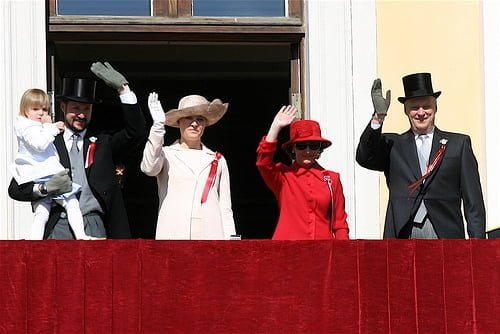Those of us watching the political developments in the wake of the election have seen a kaleidoscope of people passing by – Brown, Cameron, Clegg and all their understrappers have all been very busy. They all have one thing in common. They are interested in politics. But at this crucial time their attention has been concentrated on an unusual figure – the Queen. She’s unusual because she’s not interested in politics at all. Her favourite paper is the ‘Racing Post’ and her major interest is in horse racing
Yet the politicians’ future and that of the country depend on her. In this election nobody elected her, but she’s a key fugure. Apparently she’s vital to the future of the country. Why does she hold this power? Could this octogenarian be used as part of an establishment plot?
Once it was clear that there was no overall majority for any one party, the question was asked – who is running the country now? Constitutional experts were wheeled out to explain that, for the time being, Gordon Brown was to stay in Number 10. Why? Because apparently that was what the Queen wanted.
And on May 10th, Joe Murphy explained in the Evening Standard that, “To form a government, Mr Cameron has to be invited to do so by the Queen. The Queen, however, will only summon him if she is advised to do so. And the person who is constitutionally tasked to give her that advice is none other than Gordon Brown.”
What on earth is going on here? Clearly the Queen, or rather the institution of the Monarchy, is a major constitutional player in time of crisis, which this is. The Monarchy is part of the establishment and will be used to determine affairs in the interests of the establishment.
It is quite important for them that the Monarch be seen as ‘impartial’ and a purely ceremonial head of state. This weapon in the locker of the ruling class must not be unleashed prematurely. If the element of surprise is lost, the weapon loses its effectiveness.
Peter Hennessy, in his book, ‘The Prime Minister’ states: “In no circumstances must the Queen be embarrassed or drawn into or suspected of being drawn into political strife or partisanship.” … “Lord Armstrong (the top civil servant) told me: ‘In the hung Parliament situation, the Sovereign and the Sovereign’s advisers … would have as primary objectives to ensure that the government of the country was carried on, and that everything possible was done to avoid the Sovereign being put into a position where action had to be taken which might bring the Crown into the area of political controversy’”
Hennessy was laying down the law again on television on election night. He said of the Queen, “She is the Heineken beer of our system: there are parts of our constitution only she can reach.” Jonathan Freedland commented in the Guardian the following day, “That was a shocking truth few Britons had seen so starkly before – that the casting vote is ultimately held by an unelected Monarch.”
King George V was a similarly apolitical figure to the present Queen. His only real interest was in stamp collecting. Here is how the Monarchy was used in 1924. At the end of 1923 an election was called which did not give Labour an overall majority. The Tory leader, Baldwin tried to form a government at the instigation of the King, but was brought down by the combined Labour and Liberal vote.
The King then sent for Ramsay MacDonald to form the first minority Labour government. In this situation the Monarchy was of key political importance, not just a source of revenue from tourism. The Privy Council advised the King that Labour should be given a chance. The right wing Labour leaders of the time were seen as trustworthy statesmen. Their failure to implement their programme would suitably demoralise the labour movement and teach the workers a lesson.
Later the Monarchy was used to bring down the Labour government of 1929-31. The world crisis after 1929 produced a doubling of unemployment. The government was running a deficit and the establishment called for cuts. There was a run on the Pound.
Seeing that government support for these cuts would not be forthcoming, MacDonald then asked for the resignation of his ministers and went to the King. It was there and at a secret meeting with opposition leaders that he was ‘advised’ not to resign but to form a National Government.
He returned to an astonished Labour Cabinet to tell them that they were sacked and that he would be leading a government in which the leader of the Tory Party, Baldwin would be the deputy. This act of trickery ended the second Labour government.
It was a coup, British style, again illustrating the complete arrogance of the British ruling class in its attitude towards democracy. A Labour Government had its programme dictated to by the bankers and the leaders of the capitalist parties.
Events in Italy were more extreme. King Victor Emmanuel invited Mussolini to form a government in 1922, leading to the formation of the world’s first fascist state. No wonder the Italian people opted for a republic at the first opportunity in 1946.
This is what we say in ‘Socialist Appeal: what we stand for’:
“The ability of the Monarch to interfere in the political process is part of their prerogative powers. These are medieval in origin, they are profoundly undemocratic and they should be abolished. In practice they are often used by the Prime Minister as a way of ignoring or sidestepping Parliament. In 2003 Tony Blair used the prerogative powers to take us into the illegal invasion of Iraq.”
The Monarchy is an obstacle to radical change. It’s high time we got rid of it, but that will probably only come about as part of socialist revolution.






